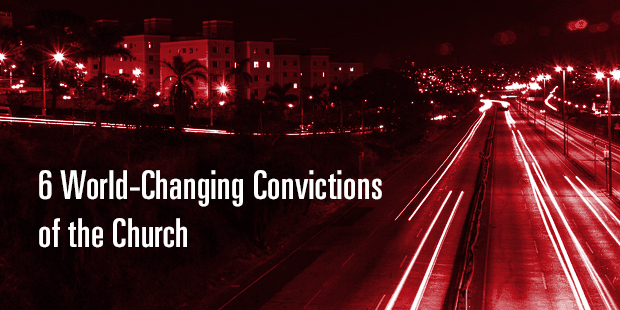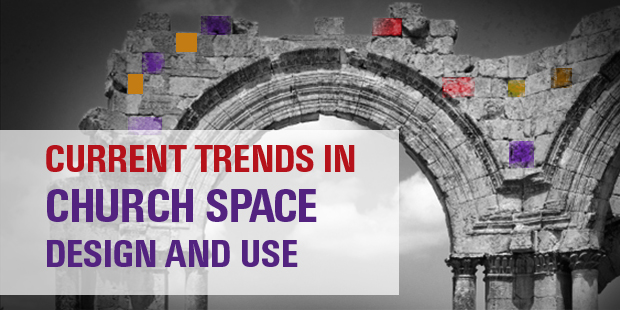
6 World-Changing Convictions of the Church
You tend to base your decisions on one of four motivations in life: circumstances, conveniences, criticisms, or convictions. Yet only decisions that are based on your convictions will last and leave a lasting legacy.
The people who have made the greatest impact on this world, for good or bad, are those who had the deepest convictions. They weren’t necessarily the smartest people, the brightest people, the most educated, the wealthiest, or even the most famous.
If you’re going to build convictions, you need to build them on something that’s going to last. Everything changes. Fads change, fashions change. Psychology changes. Even science textbooks change. We keep learning more and more. There’s only one thing that never changes. That is the truth of God. If it was true a thousand years ago, it will be true today and it will be true a thousand years from tomorrow because truth does not change.
The Bible says this in Isaiah 40:8: “The grass withers, and the flowers fade, but the word of our God stands forever” (NLT).
Saddleback has been built on six biblical convictions that are all based on God’s eternal Word. I’m willing to go to the mat for all six convictions. Here they are.
1. It’s all about God.
It’s not about me. It’s not about you. It’s not about profit, politics, or anything else. It’s all about God. Until you understand that, life and ministry are never going to make sense. In Romans 11, the Bible says, “For everything comes from him and exists by his power and is intended for his glory” (Romans 11:36 NLT).
What’s the implication of that?
If it’s all about God, and it’s not all about making money or being popular or anything else the world thinks is important, then the implication is that it is more important to love God than anything else. It’s my very first priority. Jesus said in Matthew 22:37-38, “Love the Lord your God with all your heart and with all your soul and with all your mind. This is the first and greatest commandment” (NIV).
2. Only the Church will last forever.
Nothing on earth will last forever – no business, government, or nation. But the Church will.
Jesus said in Matthew 16:18: “I will build my church and all the powers of hell will not conquer it” (NLT).
A thousand years from today, there probably will be no United States of America. No nation lasts forever – no empire lasts forever. Where’s the Roman Empire today? Where’s the Greek Empire? A thousand years from today, there probably won’t be a Microsoft. A thousand years from today, even many of our good Christian organizations will be gone. Nothing man-made lasts. Nothing but the Church.
I’ll give my entire life to serve the Church – Saddleback and the global Body of Christ.
That matters more to me than anything else in the world. All of our staff tithe their time. That means 10 percent of our time goes to help other churches. We’re not in this just for our church. Over the years we’ve trained more than 400,000 pastors from 163 countries.
What does this conviction mean for you and me? If we’re all going to live together forever, we better get along. It’s not enough just to love God. You must love the Church – despite all of our differences. The Bible says Christ died for the Church, the whole Church, anyone who has made Jesus Lord of his or her life.
Love is more important than personal differences in the family of God. Love is more important than political differences. We need to love our brothers and sisters in Christ.
3. God expects me to love everybody else too.
I don’t know if you see the pattern here, but it’s all about love. Life is not about the acquisition of things. It’s not about achievement. It’s not about popularity. It’s about learning how to love. If you miss that, you miss the lesson of life. God is love. And he says the most important thing is to love him. The second most important thing is in Mark 12: “The second most important commandment is love your neighbor as yourself” (Mark 12:31 NLT).
So who is our neighbor? That’s not a new question. It was asked right after Jesus said this. That’s when Jesus told the story of the Good Samaritan. The short answer is everybody is your neighbor. There is nobody you’re allowed to not love on this earth.
That means you’re to love the unlovely, those who are different, difficult – and even dangerous. You’re supposed to love everyone.
It’s easy to love people who agree with you. It’s easy to love people who are cool. And it’s easy to love people who are safe. But God says that he wants you to take it even further. He says we’re to love even our enemies (Luke 6:35).
It’s tough to love people who are treating you poorly – or love someone who believes something totally antithetical to what the Bible teaches. But God says we’re to love even our enemies.
4. The whole world needs Jesus.
The whole Bible testifies to this, particularly the Great Commission. In it, Jesus tells us to “go and make disciples of all nations” (Matthew 28:19 NIV). Does it say, go and make disciples of some nations? No. All nations. Does that include Syria? Yes. Does that include North Korea? Yes. Does that include Iran? Yes. No nation is off limits. As Christians, we report to a higher authority – Jesus Christ. I’m not a politician; I’m a pastor. If Iran opens the door, I’m going. There is no place I won’t go. I’d go into hell if I could bring people out with me. There is no place I would not go.
If the whole world needs Jesus, then we have to share the Good News. To keep it a secret would be criminal. If you knew the cure for a dreaded disease – like cancer or AIDS – and you didn’t share it, that would be criminal. We have something better than that. We know the cure for the human heart. We know the cure for the deepest needs of mankind. We need our past forgiven, a purpose for living, and a home in heaven – we need Jesus.
You may be a pastor, yet you’ve never made this truth your own. It’ll change your life. How? First, it’ll change your priorities. You no longer live for yourself; you’re living for Jesus.
Then your perspective changes. You no longer regard people the way you used to. They’re not objects; they’re priceless souls that Jesus shed his precious blood for. They’re worthwhile and they’re valuable. I don’t care if the person is a coke smoking crack junkie in the alley, he or she is valuable to God. We must look at people not as objects but with a broken heart.
5. Everything is possible with God.
The Bible says, “Jesus looked at them and said, ‘With man this is impossible, but with God all things are possible’” (Matthew 19:26 NIV). Why did we launch the P.E.A.C.E. Plan? What makes us think that Saddleback Church could lead hundreds of thousands of other churches to go after the five biggest problems on the planet? The answer is we have a big God.
Jesus also said: “According to your faith it will be done unto you” (Matthew 9:29 NIV). You know what the implication is? God’s waiting on you. God is waiting for you to trust him. God wants to use you. He wants to bless you. He wants to do amazing things in your life. He wants you to be a world changer. You just need to stop saying, “I can’t.” That’s a lie. All things are possible to him who believes God. God gets the most glory when we trust him for the impossible.
6. History’s conclusion is inevitable.
I believe this with all my heart. It’s a fait accompli. It’s done. It’s finished. There’s no doubt. I’ve read the final chapter. The Bible tells us how it’s going to end. One day, God’s going to wrap it all up here on earth and he’s going to take his children who’ve trusted him to heaven for ever and ever. In Matthew 24 the Bible says, “The Good News about God’s Kingdom will be preached in all the world to every nation, to every people group, and then the end will come” (Matthew 24:14 ICB). It’s a certainty.
Fellow pastors, we are not trying to bring in the Kingdom here on earth. It’s not going to happen here on earth. What we are trying to do is populate the Kingdom of Heaven. We want to take all our friends and everybody else with us. We want to get people into the Kingdom of Heaven, where they’re going to be for eternity.
These six convictions of mine are behind everything we do at Saddleback and everything I say. It’s all about God’s glory. God gets glory when I love him with all my heart. He gets glory when I love you and other people in the family of God. God gets glory when I love my neighbor and the people I’m least likely to love. He gets glory when I love my enemy and when I treat them with dignity and respect even though they disrespect me. God gets glory when I share the Good News with everybody. God gets glory when I trust him with problems in my life that cannot be solved except through a miracle. And God gets glory when I know and trust that the end is inevitable and, in the end, he wins.
> Read more from Rick.

Tags: Convictions, Rick Warren, Saddleback Church

















